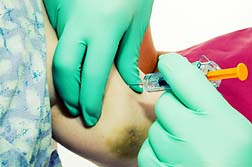 "Laverne's major problems were loss of breath and sweating and severe chest pains. She was unresponsive to the extent that I'd have to almost shake her to start her breathing again. I had to get an ambulance a few times and they admitted her as a heart attack victim and did all kinds of tests. But the last time she was admitted they flew her by helicopter to a larger hospital and determined that she never did have a heart attack. They never came up with a diagnosis either.
"Laverne's major problems were loss of breath and sweating and severe chest pains. She was unresponsive to the extent that I'd have to almost shake her to start her breathing again. I had to get an ambulance a few times and they admitted her as a heart attack victim and did all kinds of tests. But the last time she was admitted they flew her by helicopter to a larger hospital and determined that she never did have a heart attack. They never came up with a diagnosis either.Around December I watched something on the TV news about heparin and its side effects. All the problems Laverne had matched their list. Then I tried to find out what could be done to counteract the problems that might have been caused by the heparin, to get her health back. Everybody acts like they want nothing to do with it; the doctors don't seem to want to be involved—they would just tell us to see another doctor. Sometimes they even offered to make us an appointment with another doctor--we just got the proverbial shuffle."
All this time Laverne was having more tests, including x-rays and a CAT Scan, and she was finally diagnosed with thrombosis--the formation or presence of a blood clot within a blood vessel. George looked online but couldn't find anything from the heparin manufacturers about blood clots because their drug is a blood thinner, but he did find out from the American Heart Association that it can do the opposite of acting as a blood thinner: rather than prevent new blood clots, heparin can actually cause blood clots.
"Laverne was in excellent health until she fell and was given this blood thinner," George says. "She worked as a private health care worker, taking care of elderly people in their homes. She cooked for them, gave them baths—her job required a good deal of strength. She is very poorly now. Her blood pressure goes up and down—another side effect. One day it is 190 over 89 and right now it is real low: 88 over 59. Now she needs a caregiver, 7 hours a day.
"Last night she woke up with severe pain in her leg, so she took an aspirin and it went away. [Laverne should seek medical attention right away—she could possibly have a blood clot in her leg.] So many weird things go on with her health. She got to the point where her whole mouth would be so sore she couldn't eat—there are so many problems I can't remember all of them. When she fell, she weighed 170 lbs. Now she weighs about 90 lbs. She eats very little and has no appetite; if she eats more than a few ounces of food, it comes back up. She is always nauseated and dizzy—and it all started after she got these heparin flushes."
George heard correctly: surprisingly, Heparin can promote thrombosis. It is known as Heparin-induced thrombocytopenia (called HIT; sometimes known as HIT type II); a serious, immune system–mediated complication of heparin therapy often resulting in devastating thromboembolic outcomes.
READ MORE HEPARIN LEGAL NEWS
"The pervasive use of heparins makes HIT one of the most important adverse drug reactions confronting physicians."
Other complications of HIT include skin lesions (usually at the injection site) and acute systemic reactions, including fever, chills, hypertension, tachycardia, chest pain, dyspnea, or other symptoms, which occur 5 to 30 minutes after administration of an intravenous heparin. Among HIT patients with thrombosis, 9 percent to 11 percent require a limb amputation. The chance of death is anywhere from 11 percent to 30 percent.
Heparin is among the most frequently prescribed medications in the United States, with about 1 trillion units used and 12 million patients treated annually.
